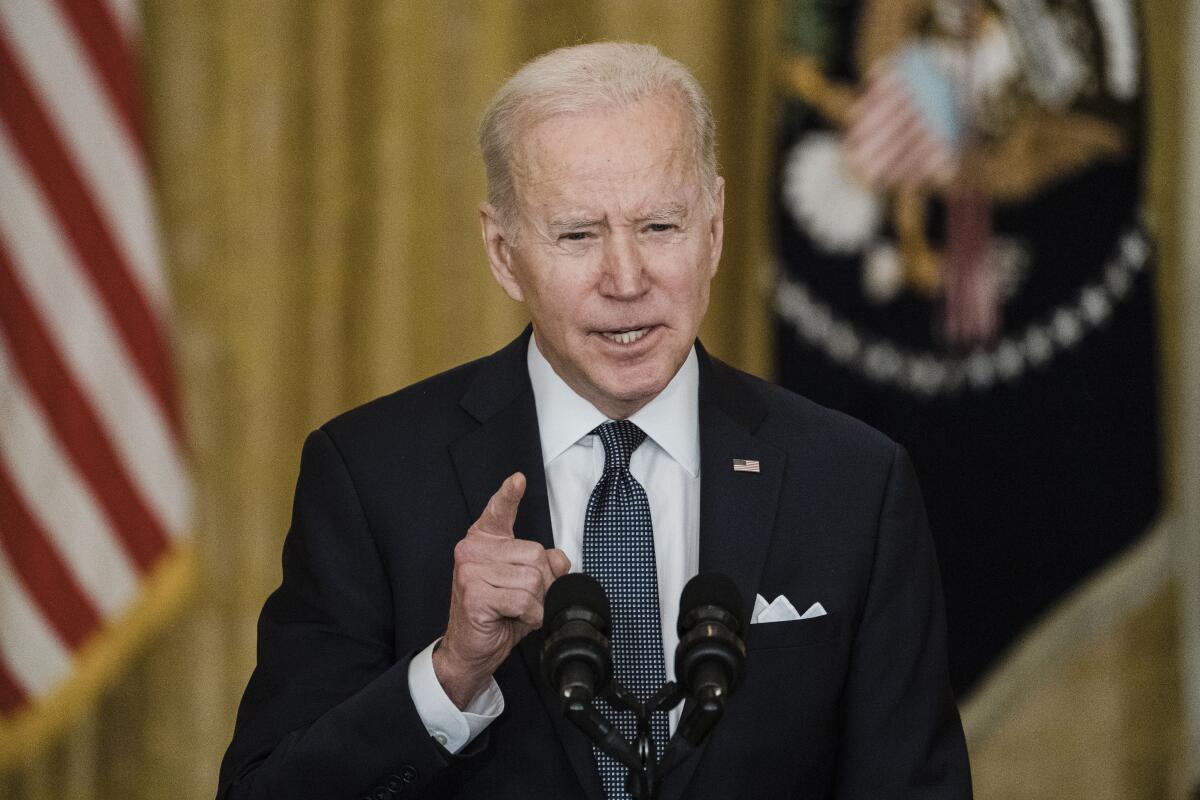Editorial: What penalty will stop Putin’s walk toward war in Ukraine?

Even as tens of thousands of Russian troops massed near Ukraine’s borders, it was always possible that Russian President Vladimir Putin might stop short of an invasion of that country.
That hope faded this week, with Putin’s decision to recognize two Ukrainian provinces as independent states and send Russian soldiers, or “peacekeepers” as he called them, to those regions. President Biden called it “the beginning of a Russian invasion of Ukraine,” leaving the United States and its European allies with little choice but to trigger crippling economic sanctions.
Biden announced significant sanctions against several Russian financial institutions that he said would “cut off Russia’s government from Western financing.” This would block Russia from raising money from the West. Biden also said that new sanctions would target “Russian elites” and their family members.
Yet the president acknowledged that he was keeping in abeyance even more damaging penalties, such as imposing sanctions on additional, larger Russian banks and export controls that limits Russia’s ability to import technology, aircraft and automobile components, in hopes that Putin would be deterred from further aggression against Ukraine.
Biden said that “we’ll continue to escalate sanctions if Russia escalates.” He said that Putin was “setting up a rationale to go much further,” but he also held out hope of diplomacy that would avert “the worst-case scenario that will bring untold suffering to millions of people.”
But prospects for a negotiated resolution are dim. On Tuesday, Secretary of State Antony J. Blinken said that he was withdrawing from a planned meeting with Russian Foreign Minister Sergei Lavrov. A 2015 agreement that aimed to resolve conflicts in eastern Ukraine also is in tatters.
Some critics might ask why the U.S. should not impose the most severe sanctions now given the Russia’s behavior so far, including the annexation of Crimea from Ukraine in 2014.
The calibrated response Biden described on Tuesday makes sense given the limited options.
There is no guarantee the threat of even more severe penalties will deter Russia from further aggression, including an attack on the Ukrainian capital, Kyiv. But Putin has been put on notice that Russia will pay an even greater economic price if it escalates its aggression. The fact that Moscow already has violated Ukraine’s sovereignty doesn’t mean that the U.S. and its allies shouldn’t try to use the threat of more painful sanctions to to prevent further Russian aggression, including additional mechanisms to seize or freeze the assets of the wealthiest Russians, or Putin himself.
The Biden administration has responded intelligently to Putin’s threats to Ukraine. Biden and his team have forged a mostly united front with European nations, including Germany. On Tuesday, Chancellor Olaf Scholz said that Germany would not continue with certification of the Nord Stream 2 natural gas pipeline that would have carried natural gas from Russia to Germany. The $11-billion Russian investment would have been another way for Putin to gain additional leverage over Europe by controlling its energy supply.
It may be that no Western plea or punishment will induce Putin to abide by Russia’s past commitment to honor Ukraine’s sovereignty and territorial integrity. In a pugnacious speech on Monday, Putin made it clear that he has contempt for the very notion of Ukraine as an independent nation, saying that the former Soviet republic “never had a tradition of genuine statehood.” So much for the idea that Putin is motivated simply by an apprehension that Ukraine would join the North Atlantic Treaty Organization.
Because Ukraine does not belong to NATO, members of the alliance are not obligated by the North Atlantic Treaty to defend it militarily. But the U.S. and its allies are right to use their power and influence in other ways to try to protect Ukraine’s sovereignty and independence against a predatory neighbor. Though far from guaranteed, that expectation might still be possible.
More to Read
A cure for the common opinion
Get thought-provoking perspectives with our weekly newsletter.
You may occasionally receive promotional content from the Los Angeles Times.










